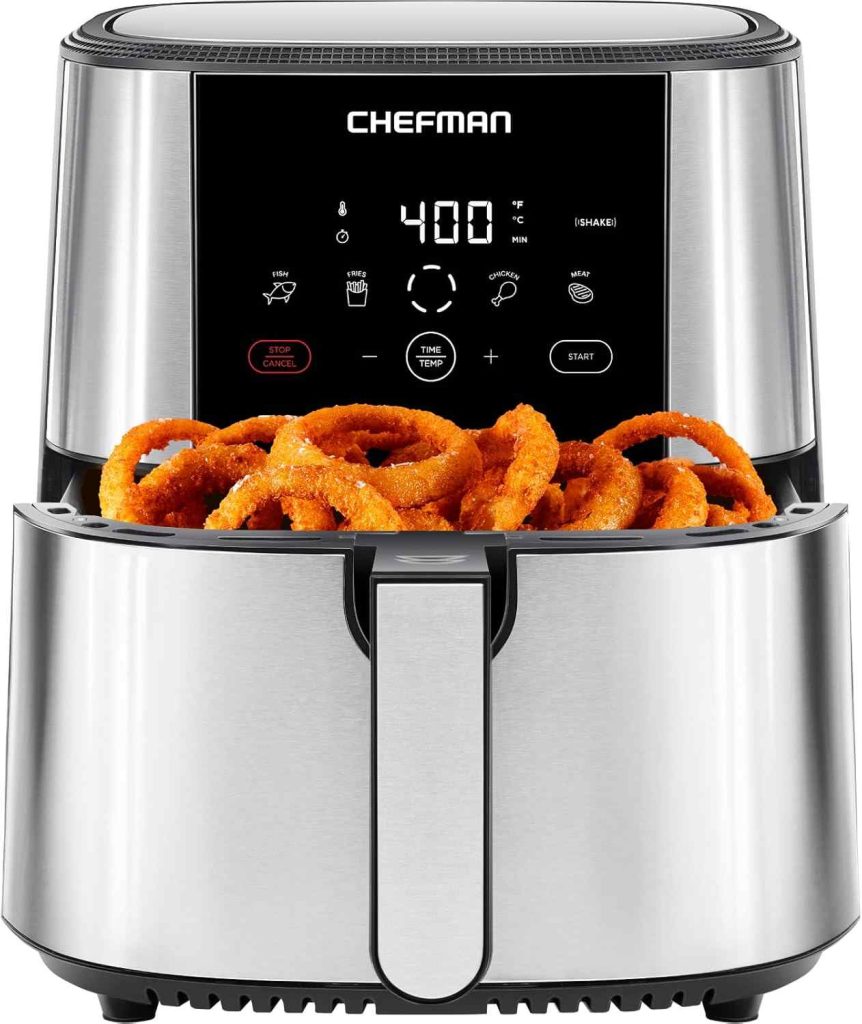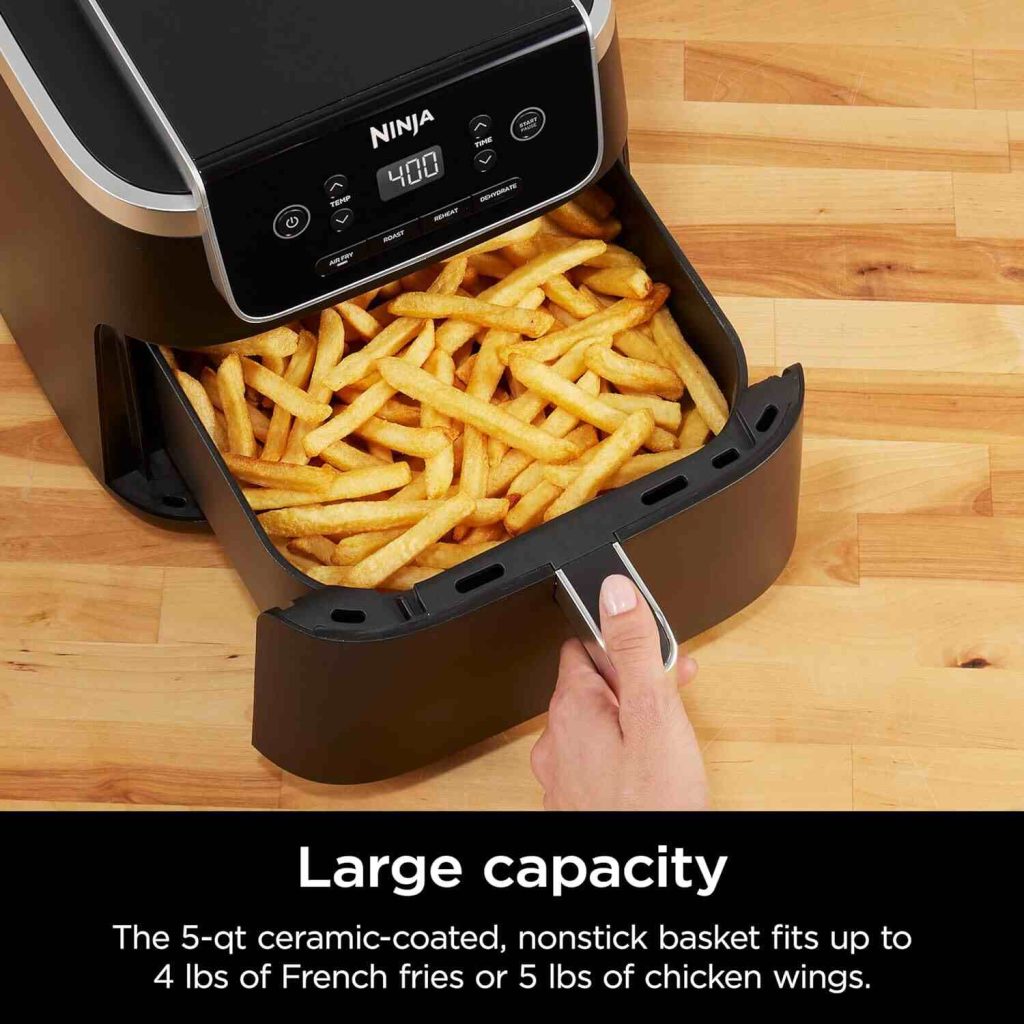Introduction:
Is Air Fryer Healthy In recent years, the air fryer has gained immense popularity as a kitchen appliance, touted for its ability to replicate the crispy texture of fried foods without the need for excessive oil. But the question that often arises is: Is air frying truly a healthy cooking method?
Understanding How Air Fryers Work
An air fryer uses a powerful fan to circulate hot air around the food, cooking it quickly and evenly. This method mimics the effect of deep frying by creating a crispy outer layer while maintaining a moist interior. Unlike traditional frying, which submerges food in hot oil, air frying typically requires only a small amount of oil, if any.
The Health Benefits of Using an Air Fryer
Reduced Oil Consumption: One of the most significant health benefits of using an air fryer is the drastic reduction in oil use. Traditional deep frying can add hundreds of calories to a dish due to the absorption of oil. In contrast, air frying can reduce calorie intake by up to 70-80%, depending on the recipe. This makes it an attractive option for those looking to lower their fat intake without sacrificing flavor or texture.
Lower Risk of Heart Disease: High consumption of fried foods has been linked to an increased risk of heart disease, primarily due to the high levels of trans fats and saturated fats in deep-fried foods. By using an air fryer, individuals can reduce their intake of these unhealthy fats, potentially lowering their risk of heart-related issues.
Less Formation of Harmful Compounds: When foods are fried at high temperatures, harmful compounds such as acrylamide can form. Acrylamide, a chemical that forms in starchy foods during high-temperature cooking, has been associated with an increased risk of cancer. Air frying, which uses lower temperatures than deep frying, may reduce the formation of acrylamide, although it does not eliminate it entirely.
Preservation of Nutrients: Air frying can help preserve certain nutrients that might be lost during traditional frying. Since air fryers cook food quickly and at lower temperatures, they can retain more of the vitamins and minerals in vegetables and other foods.

Potential Downsides of Air Frying
While air frying offers numerous health benefits, it is not without its potential drawbacks.
Not a Free Pass for Unhealthy Foods: Air frying can make traditionally unhealthy foods, like french fries and chicken wings, slightly healthier by reducing fat content. However, it’s important to remember that these foods are still high in calories and should be consumed in moderation. Air frying doesn’t transform these items into health foods; it simply makes them a bit less harmful.
Overconsumption Risk: Because air-fried foods can be perceived as healthier, there’s a risk that people might overeat them, leading to excessive calorie intake. Portion control remains crucial when using an air fryer.
Limited Scope for Certain Foods: While air fryers work well for many types of foods, they may not be suitable for all cooking methods. For example, they might not provide the same depth of flavor as slow-cooking or roasting, especially for dishes that require a more complex preparation.
Tips for Healthier Air Frying
To maximize the health benefits of air frying, consider the following tips:
Use Healthy Oils: When using oil in your air fryer, opt for healthier choices like olive oil or avocado oil, which are rich in unsaturated fats.
Choose Whole Foods: Focus on air frying whole foods like vegetables, lean proteins, and whole grains rather than processed foods.
Avoid Prepackaged Air Fryer Foods: Many prepackaged foods designed for air fryers are still high in sodium and preservatives. Preparing meals from scratch allows you to control the ingredients and avoid unnecessary additives.
Conclusion
The air fryer is a versatile and convenient kitchen appliance that offers a healthier alternative to traditional frying methods. By significantly reducing oil consumption and lowering the risk of harmful compound formation, air frying can be a valuable tool in promoting a healthier diet. However, it’s important to use it wisely, focusing on whole foods and maintaining portion control to fully reap its health benefits. While not a magic solution, when used appropriately, an air fryer can be a beneficial addition to a balanced and health-conscious lifestyle.
How much healthier is an air fryer?
The rise of the air fryer as a must-have kitchen appliance has sparked widespread interest, especially among those looking to enjoy their favorite fried foods with a healthier twist. The promise of a crispy, delicious texture with little to no oil has led many to wonder: How much healthier is an air fryer compared to traditional cooking methods?
A Closer Look at Health Benefits
Significant Reduction in Calorie Intake:
One of the primary health advantages of using an air fryer is the substantial reduction in calorie consumption. Traditional frying methods require large amounts of oil, which can add hundreds of calories to a meal. For example, deep-frying a potato in oil can add around 200 to 300 calories, while air frying the same potato might only add 50 to 70 calories, depending on the amount of oil used. Over time, these calorie savings can contribute to weight loss or maintenance, making the air fryer a healthier choice for those mindful of their caloric intake.
Lower Fat Consumption:
Deep-fried foods are notorious for their high fat content, which is often linked to an increased risk of heart disease and other health issues. Air frying uses minimal oil, cutting down fat content by up to 70-80%. This reduction in unhealthy fats can be particularly beneficial for individuals managing conditions like high cholesterol or hypertension.
Decreased Risk of Harmful Compounds:
High-temperature cooking methods, such as deep frying, can lead to the formation of harmful compounds like acrylamide, which has been linked to cancer. Air frying, which operates at lower temperatures, can reduce the risk of these compounds forming, making it a safer option for cooking starchy foods like potatoes and breaded items.
Preservation of Nutrients:
Cooking methods that require prolonged exposure to high heat can degrade essential nutrients in food, such as vitamins C and B. Since air frying typically involves shorter cooking times and lower temperatures, it can help preserve more of these nutrients, leading to healthier meals overall.
Enhanced Portion Control:
Air fryers are generally smaller than traditional ovens, encouraging more controlled portion sizes. This can be particularly beneficial for those trying to manage their food intake and avoid overeating.
Comparing Air Frying to Other Cooking Methods
While air frying is undoubtedly healthier than deep frying, how does it stack up against other cooking methods like baking, grilling, or steaming?
Baking: Like air frying, baking uses hot air to cook food, but it often requires little to no oil, making it a similarly healthy option. However, air frying is quicker and can produce a crispier texture that baking might not achieve without additional fats.
Grilling: Grilling can be a healthy way to cook, as it allows fats to drip away from the food. However, grilling at high temperatures can also produce harmful compounds like polycyclic aromatic hydrocarbons (PAHs). Air frying minimizes these risks while still providing a similar taste and texture.
Steaming: Steaming is one of the healthiest cooking methods as it preserves most nutrients and doesn’t require any added fats. While air frying can’t match the nutrient retention of steaming, it offers a more appealing texture for certain foods, making it a good alternative when you want something crispy without the added calories.

Limitations and Considerations
Despite its benefits, air frying is not without its limitations. It’s important to consider these factors when evaluating its health advantages:
Not a Health Miracle: While air frying reduces fat and calorie intake, it doesn’t transform unhealthy foods into health foods. Air-fried French fries are still French fries and should be eaten in moderation.
Potential for Overconsumption: Because air-fried foods are perceived as healthier, there’s a risk of eating larger portions, which can negate some of the calorie-saving benefits.
Reliance on Processed Foods: Many people use air fryers to cook pre-packaged, frozen foods that are often high in sodium and preservatives. For the best health outcomes, it’s advisable to cook fresh, whole foods in the air fryer rather than relying on processed options.
Conclusion:
In summary, an air fryer is significantly healthier than traditional deep frying, primarily due to its ability to reduce calorie and fat intake while minimizing the formation of harmful compounds. However, its health benefits depend on how it’s used. To maximize its advantages, it’s essential to focus on cooking fresh, whole foods and maintaining portion control. While not a cure-all for unhealthy eating habits, an air fryer can certainly be a valuable tool in pursuing a healthier lifestyle.
Is an air fryer healthy for cholesterol?
Is Air Fryer Healthy The growing popularity of air fryers has sparked discussions about their potential health benefits, particularly in relation to cholesterol management. For those concerned about their cholesterol levels, the question arises: Is an air fryer a healthy cooking option for managing cholesterol?
Understanding Cholesterol and Diet
However, high levels of low-density lipoprotein (LDL) cholesterol, often referred to as “bad” cholesterol, can lead to the buildup of fatty deposits in your arteries, increasing the risk of heart disease and stroke.
Diet plays a crucial role in managing cholesterol levels. Foods high in saturated and trans fats can raise LDL cholesterol levels, while foods rich in unsaturated fats, fiber, and plant sterols can help lower it. Cooking methods also influence how healthy or unhealthy a meal is in terms of cholesterol impact.
How Air Fryers Affect Cholesterol
Reduction in Saturated Fat Intake:
Traditional frying methods often require a significant amount of oil, usually rich in saturated fats. Air frying, on the other hand, requires little to no oil, significantly reducing the intake of saturated fats. This makes air-fried foods a healthier option for those looking to manage their cholesterol levels.
Minimization of Trans Fats:
Trans fats, often found in partially hydrogenated oils used in deep frying, are particularly harmful to cholesterol levels. By using an air fryer, you can avoid the need for these unhealthy oils, thereby reducing your consumption of trans fats. This is a crucial factor in maintaining a heart-healthy diet.
Healthier Cooking Oils:
When using oil in an air fryer, you have the option to choose healthier, cholesterol-friendly oils like olive oil or avocado oil, which are high in monounsaturated and polyunsaturated fats. These fats can help improve cholesterol levels by lowering LDL and raising HDL cholesterol, offering a double benefit for heart health.
Less Absorption of Dietary Cholesterol:
Deep frying can increase the absorption of dietary cholesterol from the food, particularly in animal-based products like meat and eggs. Air frying, which uses less oil, results in lower fat absorption, potentially reducing the overall cholesterol intake from a meal. This can be especially beneficial for individuals who need to monitor their dietary cholesterol closely.
Comparing Air Frying with Other Cooking Methods
While air frying is healthier than deep frying, it’s important to compare it with other cooking methods to understand its impact on cholesterol:
Steaming and Boiling: These methods involve no added fats, making them the healthiest options for managing cholesterol. However, they may not always provide the desired flavor or texture, which air frying can offer as a healthier alternative to frying.
Grilling and Baking: Both grilling and baking can be healthy options if done without added saturated fats. However, grilling at high temperatures can produce harmful compounds, whereas air frying operates at lower temperatures and can still provide a similar crispy texture.
Sautéing and Stir-Frying: These methods often require oil, but by using small amounts of healthy oils, they can still be cholesterol-friendly. Air frying might be more convenient and even lower in fat, depending on the recipe.
Potential Drawbacks and Considerations
While air frying offers several advantages for cholesterol management, it’s not without its potential drawbacks:
Over-Reliance on Processed Foods: Some people might use air fryers to cook pre-packaged, processed foods, which are often high in sodium and unhealthy fats. These can negatively impact cholesterol levels, so it’s important to focus on fresh, whole foods instead.
Portion Control: Air-fried foods can be perceived as healthier, leading to overconsumption. Even with lower fat content, consuming large portions can still contribute to high calorie and cholesterol intake.
Not a Cure-All: While air frying is healthier than traditional frying, it should be part of a broader strategy for cholesterol management that includes a balanced diet, regular exercise, and other lifestyle changes.
Conclusion:
In conclusion, an air fryer can be a beneficial tool for those looking to manage their cholesterol levels. By significantly reducing the intake of saturated and trans fats, and allowing the use of healthier oils, air frying can contribute to better heart health. However, it’s important to use the air fryer wisely, focusing on whole foods and maintaining portion control. While it’s not a cure-all, incorporating air frying into a cholesterol-conscious diet can be a step in the right direction toward improved cardiovascular health.

Can you eat healthy with an air fryer?
The air fryer has taken the culinary world by storm, offering a way to enjoy the crispy texture of fried foods with significantly less oil. For those striving to maintain a balanced diet, the big question is: Can you eat healthy with an air fryer?
The Health Potential of Air Frying
Air frying presents a promising alternative to traditional cooking methods, particularly when it comes to reducing fat and calorie intake. Here’s how air frying can fit into a healthy eating plan:
Reduced Oil Usage:
One of the standout features of an air fryer is its ability to cook foods with little to no oil. Traditional frying methods often involve submerging food in oil, which adds a significant amount of fat and calories. In contrast, air frying requires only a light coating of oil or no oil at all, leading to dishes that are lower in fat without sacrificing the desired crispy texture.
Lower Caloric Intake:
Because air fryers use less oil, they produce foods with fewer calories compared to deep-fried counterparts. For example, a serving of air-fried chicken wings might have half the calories of traditionally fried wings, making it easier to manage daily caloric intake while still enjoying indulgent-tasting foods.
Healthier Cooking Oils:
When oil is used in an air fryer, you have the flexibility to choose heart-healthy oils like olive or avocado oil. These oils are rich in monounsaturated and polyunsaturated fats, which can help improve cholesterol levels and support heart health. Using these oils in moderation further enhances the nutritional quality of your meals.
Preservation of Nutrients:
Air fryers cook food quickly and at lower temperatures compared to other high-heat methods like grilling or roasting. This can help preserve more vitamins and minerals, particularly in vegetables, making air-fried dishes not only lower in fat but also nutrient-rich.
Versatility in Healthy Cooking:
An air fryer is not just for frying; it can also be used for baking, roasting, and even grilling. This versatility allows you to prepare a wide range of healthy dishes, from roasted vegetables and lean proteins to baked goods made with whole grains and less sugar.
Practical Tips for Eating Healthy with an Air Fryer
While the air fryer offers numerous health benefits, making healthy choices when using it is essential. Here are some tips to help you maximize the health potential of your air fryer:
Focus on Whole Foods:
The best way to eat healthy with an air fryer is to cook whole, unprocessed foods. Vegetables, lean meats, fish, and whole grains like quinoa or brown rice can be transformed into delicious, crispy dishes with minimal added fat. Avoid relying on pre-packaged, frozen foods that are often high in sodium and preservatives.
Use Healthy Oils in Moderation:
While air fryers require less oil, the type of oil you use matters. Opt for oils with health benefits, such as extra virgin olive oil or avocado oil, and use them sparingly. A light mist or brush of oil is often enough to achieve the desired texture without overloading on fats.
Experiment with Spices and Herbs:
Enhance the flavor of your air-fried dishes with a variety of spices and herbs instead of salt or high-fat seasonings. Garlic powder, paprika, cumin, rosemary, and thyme can add depth to your dishes while keeping them low in sodium and high in flavor.
Watch Portion Sizes:
Air-fried foods can be easy to overeat because they’re perceived as healthier. Keep portion sizes in check to avoid consuming more calories than intended. Pair your air-fried dishes with a salad or steamed vegetables to create a balanced meal.
Balance Your Diet:
While air frying can make traditionally unhealthy foods like fries or chicken wings healthier, they should still be enjoyed in moderation. Ensure your diet includes a variety of cooking methods and plenty of fruits, vegetables, whole grains, and lean proteins.
Potential Pitfalls to Avoid
Despite its benefits, there are some pitfalls to be mindful of when using an air fryer:
Overuse of Processed Ingredients: Pre-packaged, air-fryer-ready foods may be convenient, but they’re often high in unhealthy fats, sodium, and preservatives. Stick to fresh, homemade ingredients whenever possible.
False Sense of Healthiness: Just because something is air-fried doesn’t mean it’s automatically healthy. Foods like air-fried desserts or breaded items can still be high in sugar, refined carbs, or unhealthy fats if not prepared carefully.
Overcooking: Air fryers can cook food quickly, so there’s a risk of overcooking, which can lead to a loss of nutrients. Monitor cooking times closely to avoid this.
Conclusion:
Is Air Fryer Healthy can be a valuable tool in your quest for a healthier diet. By significantly reducing fat and calorie intake and preserving nutrients, it allows you to enjoy flavorful, crispy dishes without the guilt associated with traditional frying methods. The key to eating healthy with an air fryer lies in making thoughtful choices about the ingredients you use and how you prepare your meals. With the right approach, an air fryer can help you achieve and maintain a balanced, nutritious diet. Preheat, lightly oil food, and place it in the basket. Set time and temperature, then air fry until crispy and cooked through. Shake or flip halfway. Compare air fryer and toaster oven: Air fryers cook quickly with less oil, while toaster ovens bake, broil, and toast with more space.
As an Amazon Associate, We earn from qualifying purchases. When you purchase a product through Amazon links on kitchenadvising.com, we may earn a small commission at no extra cost to you. This helps support the site and keep our content free.


